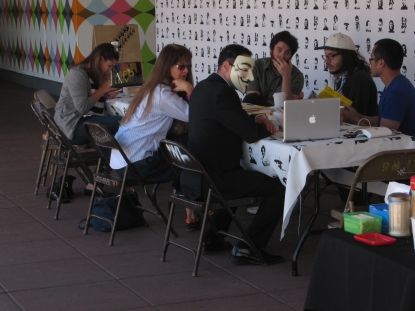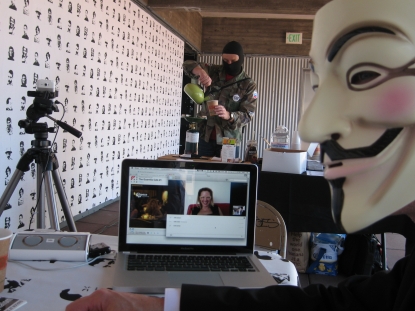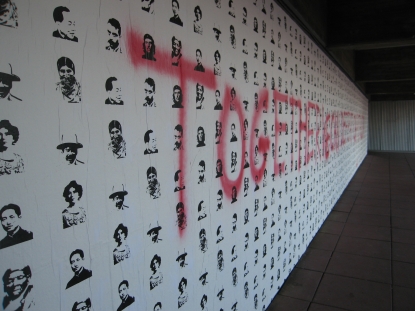Feature: Essays
Tea and Sympathy: the promise and perils of tea with strangers
- Temporary Structures @ Walter and McBean Galleries
- San Francisco Art Institute
- Friday, September 14 - Saturday, December 15, 2012
In fall, 2000 the United States stood at the threshold of a series of events that were to transform our lives, understanding, and perceptions of the world and our place in it. Imagine (if you still can) a time before Bush v Gore, 9/11, and the dot-com-bubble-burst; a time when one could still conceive of the possibility of sitting down with strangers and talking politics and revolution over a nice cup of tea. Andy Cox, artist, engineer, and Englishman sought to devise just such a project for one brief month in October-November 2000. Cox served tea and cake to any and all takers at an intimate, pop-up gallery space founded and run by artist and DJ Eugene Marsh called e-Mission, located on a perennially run-down stretch of 26th street near South Van Ness in San Francisco's Mission district. There, friends, project volunteers (including me), and strangers would gather to talk electoral politics, Marxist theory, the gift economy, and art over tea and cake served by the artist-host. These afternoon tea events were simulcast over the web on a 2000-era internet connection, capable of broadcasting a serial flip-book-like strand of still images of comings and goings, chatter, and tea drinking. Also brewing in this fertile climate were the origins of this very publication, as its founding group were among the Tea Room's most stalwart denizens. It is quite possible that without it, Stretcher might never have been hatched.
Fast-forward to 2012 in a very different, far more politically polarized America, Cox and his collaborative group Together We Can Defeat Capitalism (TWCDC) have rebooted and updated the project as part of the San Francisco Art Institute McBean Gallery exhibition Temporary Structures, co-curated by Glen Helfand and Cydney M. Payton. In a perhaps deliberate attempt to avoid now-problematic tea-related associations, the renamed Guerrilla Cafe served drinks, snacks, and informal chat to Occupy members, art world denizens, future participants in the gig economy, art star wannabes, and random passers-by, offering a newly expanded menu of cheeky (but by all reports tasty) drink concoctions (the Che Guevara, the Emmeline Pankurst, etc). Streaming technology has improved, and Cox is now employing a free UStream feed to connect his table to the world - a feed which ironically fed us a steady stream of ads promomoting vacations in Greece barely a week before the streets of Athens erupted into renewed protests over a new wave of austerity measures.
Rather than hosting a daily drink service, this iteration of the Cafe hosted two service-event performances, replete with camoflauge costumes, Guy Fawkes masks, and fake machine guns. I Skyped in to the first "service" to take the temperature of the project and muse with Cox and attendees about the differences between San Francisco then and now and on the implicit obligation of joining a table full of strangers for conversation on topics most in America today dare not engage. Several original attendees were on hand to reminisce, discuss the most recent Romney gaffe, the intertwined foreclosure and banking crisis, and what Cox hopes to accomplish.
Now nestled within the rarified confines of an elite art school in one of the most uniformly progressive cities in the United States, the project can easily avoid any harsh challenges from random passers by. Still, it's surprising how even within this uniformly progressive setting, conversational fault lines still formed. When I tuned in, a participant was discussing enlisting Art Institute students for unpaid internships, and the discussion swirled around what was a legitimate use of free student labor, the gig economy, and the dream of winning the auteur lottery. We reminisced about notable attendees past - I recalled some neighborhood locals reluctant to take Cox up on the offer of tea and conversation, and one attendee, a nondescript, middle-aged woman so incapacitated with carpal tunnel wrist braces that her partner fed her (she later claimed it all to be a performance). We recalled how, during the first dot com boom (then just on the verge of bust) a swarm of highly paid technorati had descended on our "fashionably edgy" neighborhood, had later vanished like a migrating flock, and have now returned, waiting in long lines for the tinted-windowed, unmarked Google corporate bus, eyes trained on their smart phone screens, seemingly oblivious to the drunks and junkies lying face down on the sidewalk at the nearby BART station. Perhaps the ultimate result of the past twelve years is that whatever innocence we once posessed has been finally and forever lost.
The work, a performance/social experiment has, of course, many precedents, from Joseph Beuys, to Rikrit Taravanijian, to Food Not Bombs and many others. Beyond the humble act of serving and gifting, Cox wondered aloud what exactly he himself had wanted from the experience of creating and performing the work. Was the project a simple attempt to spur dialogue about political and social change, and if so, did (and does) he feel it has accomplished that? In an age of increased ideological polarization, is it even possible to conceive of fruitful dialog between a progressive liberal, a hardcore OWS member, and a Tea Party conservative? Certainly, such a quixotic act as this taps into the DNA of art itself, for what is its practice other than quixotic to its core? Perhaps sharing space and ideas under the sheltering act of generosity signified by a tasty, free drink and civil conversation may be the only hope we have.



